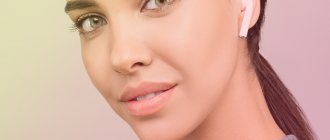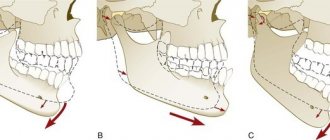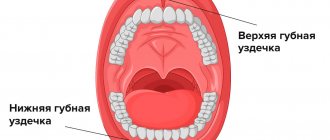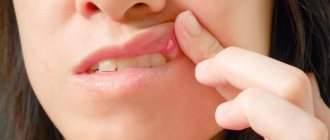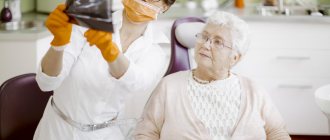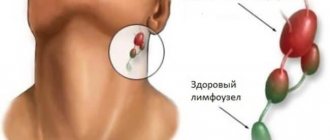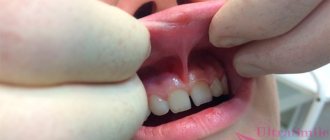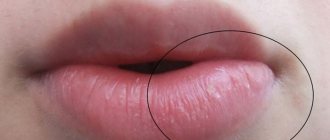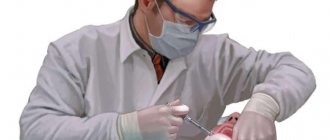The labrum is a rim of fibrocartilaginous tissue around the glenoid fossa that enlarges the socket cavity and provides stability to the head of the humerus. The labrum also connects the capsular-ligamentous structures of the shoulder joint. Labral tears can occur due to repetitive motion of the shoulder or acute trauma. In athletes with repeated anterior subluxations of the shoulder, tears of the anterosuperior labrum may occur, leading to progressive instability.
Lip laceration: first aid
Pre-processing is carried out in the following sequence:
- Stop bleeding - cold is applied to the lip, followed by hemostatic agents to reduce bleeding. It is recommended to treat the wound with hydrogen peroxide to prevent inflammation.
- Reassure the person and record the time of the wound formation - if there is a large loss of blood, hemorrhagic and painful shock can occur, so talk to the victim and maintain communication with him before coming to the hospital.
- Reducing pain in the wound - the patient can be given any painkiller (Analgin, Nurofen), which will reduce pain symptoms and improve the general condition.
How to properly freeze a wound on the lip
In the absence of breathing and a threadlike pulse, it is necessary to carry out a series of resuscitation measures aimed at maintaining vital processes in the body. Artificial respiration is performed through the nose, as the wound site may become infected. Indirect cardiac massage allows you to avoid clinical death, but if performed incorrectly, complications can arise.
If the patient is unconscious, place him on his side so that if the wound bleeds, blood does not enter the stomach through the mouth. Severe painful shock can cause vomiting, so lying on your side minimizes the likelihood of vomit entering the respiratory system.
Symptoms
Symptoms of a labral tear resemble those of other shoulder injuries. Symptoms include:
- Shoulder pain is usually associated with raising the arm
- Clicking, crunching, or shoulder locking
- Sometimes pain at night or pain when doing daily activities
- Feeling of instability in the shoulder
- Decreased range of motion in the shoulder
- Decreased muscle strength
Patients with a labrum injury may describe their pain as intermittently interfering with normal shoulder function during certain activities. On examination, they may have discomfort with forced external rotation of 90 degrees, and the pain does not increase with further abduction. Often, a labral tear is manifested by a crunching or clicking sound during forced external rotation. The patient may also experience discomfort with forced horizontal shoulder adduction.
Lacerated wound of the lip: main stages of treatment
Wounds on the lips caused by a blow or other minor mechanical injury can be treated at home using special wound-healing creams and ointments. If the parting of the edges exceeds 1 cm, it will be necessary to apply sutures, which are performed by a doctor under sterile conditions.
Drug therapy
The healing time of a wound on the lip depends on the degree of its damage and the specifics of the body’s regeneration. On average, the entire process takes 2-3 weeks. To speed up healing and facilitate the entire process, the following groups of drugs are used:
Causes
Injuries to the tissues of the rim (labrum) surrounding the shoulder rosette can occur either as a result of acute trauma or as a consequence of repetitive movements of the shoulder. For example, damage to the labrum can occur in the following cases:
- Falling on an outstretched arm
- Direct hit to the shoulder
- A sudden pull with the hand, for example, when trying to lift a heavy object
- Excessive overhead movement of the arm
Labral tears can also occur in throwers or weightlifters and result from excessive repetitive stress on the shoulder. In weightlifters, labral tears can also occur as a result of overuse during exercises such as barbell, bench, or standing presses. Posterior rotator cuff weakness can contribute to labral tears. Labral tears can occur as a result of acute injuries such as a fall on an outstretched arm, but also occur in athletes where there is intense shoulder movement (eg, golfers).
Lip laceration: recommendations
The wound should be protected with a bandage, under which a tampon or bandage with ointment should be placed. Do dressings 2-3 times a day. Before applying a new layer of cream, the old one is removed by washing with hydrogen peroxide.
If the wound is infected and has become swollen and swollen, rinsing with furatsilin will help. If hardening occurs and pain increases, you will need to consult a specialist again, who will select suitable antibiotics that can stop the inflammatory process.
Chlorhexidine and miramistin can be applied to the inside of the wound, helping to prevent inflammation from spreading into the oral cavity. The use of drugs, their choice and duration of use directly depend on the degree of damage. Treatment at home is prescribed by a doctor, after which constant monitoring of the healing process is necessary.
If there are complex wounds on the face, hemorrhagic shock may require blood transfusions and the administration of solutions to replenish the volume of circulating fluid. In this case, before the procedure, a number of resuscitation measures are carried out to maintain the body in good condition.
Why does lip inflammation develop?
There are many reasons for the occurrence of cheilitis. Different reasons cause different types of lip inflammation. However, there are some common catalysts, for example, deficiency of vitamins, iron, calcium, excessive use of various medications (for example, antibiotics), constant exposure to drafts or living in a city with very low air temperatures in winter, strong and regular ultraviolet radiation, poor immunity.
The causative agents of allergic cheilitis are, of course, allergic reactions to cosmetics or food, infectious - various diseases (viruses, fungi), glandular - dermatological diseases, meteorological - frequent chapped lips and being outside without hygienic lipstick, and candidal - stomatitis and simply poor care behind the oral cavity.
Exfoliative cheilitis occurs in those who often bite off pieces of skin from their lips or simply constantly lick them (observed only in women). These actions can be triggered by frequent anxiety and stress. Manganotti cheilitis occurs only in adult men and is provoked by various injuries to the oral cavity, stomach diseases, frequent and long exposure to the sun or in a solarium, as well as clear signs of aging, which are caused by the fact that the mucous membrane is now regenerating more slowly. Hypovitaminosis occurs due to a lack of vitamins B2, B2 and other B vitamins.
Surgical intervention
Lip wounds with radiating edges require sutures. A local anesthetic is injected into the wound site and the edges are then sutured. The suture is treated with an antiseptic, and then a sterile bandage is applied.
Stitching a wound on the lip
The suture site is checked daily for inflammation. If the healing process is successful, the sutures are removed on the 10th day. Large complex wounds and multiple stitches may require additional assistance from a plastic surgeon.
After suturing, the patient is prescribed medications such as:
After the sutures are removed, the wound is treated with an antiseptic without a sterile dressing. To prevent the development of inflammation in the mouth, rinsing with herbal decoctions, furatsilin and treatment with hydrogen peroxide are recommended.
Stitching outside a medical facility is prohibited. Even with experience, there is a high probability of infection, since it is impossible to achieve infertility at home, which is possible in the operating room.
Contraindications after lip augmentation
Lip contouring is considered a safe procedure. After it, you can almost immediately return to your normal lifestyle. The need for care and healing is still present. Although the doctor uses anesthesia, the procedure may be painful. Unpleasant sensations persist in the future. They can follow the patient for up to 3 days. In order not to worsen the condition, it is important to follow a number of recommendations. Thus, the following contraindications apply:
- It is recommended not to eat food for 3 hours. The greatest number of restrictions concerns hot dishes. It is better not to eat them during the day. Otherwise, there is a risk of spoiling the result, as well as injuring the treated area. Therefore, it is recommended to give preference to products at room temperature. Hot and spicy dishes should be excluded from the menu. Eating such food is fraught with inflammation and swelling. It is advisable to cut the food into small pieces. It's better not to open your mouth wide. This increases soreness. On the first day after the procedure, it is highly recommended not to touch the treatment area. This is fraught with infection. It needs some time to heal.
- While your lips are healing, it is better not to use decorative cosmetics. The use of lipsticks, lip pencils, balms, and glosses is prohibited. Their use is fraught with the occurrence of infections.
- Overheating must be avoided. Otherwise, restructuring of hyaluronic acid is possible. It is also better not to use cooling compresses too often. Otherwise, the skin will become excessively dry and microcracks may appear.
- It is recommended to limit physical activity. Also, doctors do not recommend showing facial activity.
- Tanning is banned for one to two weeks. During this period, it is also not recommended to be in the open sun. The above procedures lead to excessive sweating, which increases the risk of infection. Additionally, the development of hyperpigmentation and swelling is possible. All warming procedures are also prohibited. They can lead to the breakdown of hyaluronic acid.
Treating a torn lip at home
Treatment of a wound on the lip, if it is small, can be done at home. The following provisions apply for this:
If redness of the wound, swelling of the skin around it and an increase in temperature appear, you should immediately consult a doctor. Such symptoms indicate the addition of an infection that provokes the development of an inflammatory process.
To reduce wound trauma, it is recommended to refrain from eating solid foods that require careful chewing and jaw movement. You can use a blender to puree your food to make it easier to swallow. It is best to eat through a smoothie straw to prevent food from getting into the wound.
Leftover food can cause tooth decay, so you should rinse your mouth after every meal and protect the wound from the inside with a disinfectant.
In the absence of comprehensive treatment, after 2-3 days the wound begins to fester and the body temperature rises. The patient's condition deteriorates sharply and requires immediate medical attention. Refusal of medical care and suturing leads to irregular and uneven fusion of the ends of the wound, which provokes the appearance of a lip. The bite is disrupted and sensitivity is reduced. As a result, the skin becomes thinner and prone to flaking and dryness.
Diagnostics
If you have shoulder pain, your doctor will first take a medical history. Often the patient remembers a specific traumatic episode followed by the onset of symptoms. The doctor will perform functional tests to determine range of motion, shoulder stability, and pain symptoms. If there is suspicion of damage to bone tissue, radiography may be prescribed. Due to the fact that radiography does not visualize the soft tissue of the articular cavity, MRI or CT is prescribed to diagnose its rupture. Both methods of examination use contrast, which makes it possible to diagnose even minor damage to the integrity of the articular labrum. In some cases, diagnostic arthroscopy is required. The tears may be located above or below the center of the glenoid cavity.
SLAP injury (tear of the labrum, front to back, with damage to the biceps tendon).
A tear below the middle of the glenoid cavity, with simultaneous damage to the inferior ligament of the shoulder, is called a Bankart injury.
Labral tears are often accompanied by other shoulder injuries such as shoulder dislocation (subluxation or dislocation).
Types of labial frenuloplasty
There are three main types of frenuloplasty. Each of them is indicated for different diseases or anomalies of attachment.
- Frenotomy
– involves cutting the frenulum if it is too narrow or short. This operation eliminates discomfort when chewing and corrects the patient’s bite. - Frenuloplasty
is an operation in which the edge of the frenulum is fixed in another place (usually higher). Y-shaped and Z-shaped frenuloplasty are performed (the difference is in the type of incision). - Frenectomy
– resection of the wide frenulum of the upper lip. The most radical type of plastic surgery, as a result of which the interdental papilla and mucous membrane tissue are partially or completely removed.
Operation on the labial frenulum is divided into types depending on the method of implementation. Today, such plastic surgery is performed with a laser or scalpel. The laser method is more modern, painless and comfortable for the patient. The entire procedure takes a few minutes and does not require long-term rehabilitation.
Possible misconceptions and complications
Any damage to the face seriously spoils the appearance and attracts unnecessary attention, so all victims are concerned about how long it takes for a cut lip to heal. If there is no inflammation, then after a few days you will notice a significant improvement. The exact timing depends on the severity of the damage.
Getting an infection into the wound aggravates the problem. The inflammatory process begins, the rupture can “turn out”. Redness of surrounding tissues and swelling, accumulation of purulent exudate - if all of the above symptoms are observed, the doctor will prescribe appropriate medications. However, fibrin plaque is taken as a sign of inflammation, which should not be peeled off or washed.
Caring for the wound is actually very simple. You need to try not to disturb the fresh seam, and Levomekol ointment, which has weak antibacterial properties, is perfect for softening. It is not worth drying with alcohol solutions; they can provoke the formation of a rough scab, which, contrary to common misconceptions, does not contribute to a quick recovery.
